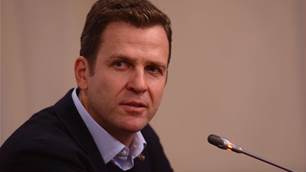There is a joke among 2010 World Cup organisers that if Danny Jordaan had a dollar for every time he had been asked about crime in South Africa he would be a rich man.
In fact, the question has been asked so many times that one reason why Jordaan is so looking forward to the opening match on June 11 is that soon he will no longer have to give his stock answer any more.
That apart, there is a tangible sense of excitement as the kick-off nears - and the realisation that this will be the biggest test for Jordaan, who has spent the last 13 years pursuing this dream.
Jordaan, the chief executive of the World Cup local organising committee, freely admits that there is a high level of expectation to get football's greatest show exactly right.
"Of course there is pressure," he said. "Whoever the host is, there will be pressure.
"There is also some additional pressure on us in that this is the first World Cup in Africa and we have had to deal with some inaccurate perceptions right from the moment we started bidding.
"We will put those incorrect perceptions right - everything we have promised we have delivered.
"All of our stadiums were completed six months before kick-off, everything else is in place.
"Those who had doubts must now realise that we have the capacity to deliver."
Jordaan, 58, was a teacher-turned-political activist who was appointed as chief executive of the South African Football Association in 1997. It was he who guided South Africa's first bid for the World Cup in which they were narrowly beaten by Germany for 2006, and then to success in the bidding for 2010.
A forceful man with a strong personality, Jordaan readily admits that his experience of the apartheid system will make his achievement in driving forward the preparations for the tournament that much the greater.
"I voted for the first time in my country when I was 42 years old," he said.
"Until then I was not even regarded as a citizen."
Jordaan's task was viewed by some as impossible and he spent the first years as head of the organising committee insisting it was not so.
When it dawned on the doubters that the money from broadcasters and sponsors would not be affected by holding the World Cup outside a developed country - in fact revenues have increased considerably compared to 2006 - that removed any remaining barriers to the event taking place in South Africa.
Jordaan says the tournament will be the most financially successful yet.
"We will deliver within our budget of 423million dollars, and FIFA will generate 3.5billion dollars from the continent's first World Cup," he said.
"In Germany, it was only 2.6 billion. This will be the highest revenue ever for a World Cup.
"The perception is that South Africa will never be ready, that the infrastructure won't be complete, the stadiums won't be complete, that we will run out of money, that no one will come to South Africa, it is too dangerous, that no one will buy tickets.
"Now we will show the world the reality."
And what about the crime and murder rate in South Africa? Jordaan's answer is of course well-rehearsed.
"Our responsibility is to have a plan safeguarding everyone coming to the event," he said.
"That is why we will have 45,000 additional police recruits and 41,000 additional police.
"If you look at the track record of South Africa, it has hosted more than 150 major events since 1994, including the Confederation Cup last year, the British Lions tours, the Rugby World Cup, the Cricket World Cup, and last year we hosted the Indian Premier League after India was deemed unsafe. In all of these there was not a single incident.
"We are comfortable but we will be vigilant."
That apart, there is a tangible sense of excitement as the kick-off nears - and the realisation that this will be the biggest test for Jordaan, who has spent the last 13 years pursuing this dream.
Jordaan, the chief executive of the World Cup local organising committee, freely admits that there is a high level of expectation to get football's greatest show exactly right.
"Of course there is pressure," he said. "Whoever the host is, there will be pressure.
"There is also some additional pressure on us in that this is the first World Cup in Africa and we have had to deal with some inaccurate perceptions right from the moment we started bidding.
"We will put those incorrect perceptions right - everything we have promised we have delivered.
"All of our stadiums were completed six months before kick-off, everything else is in place.
"Those who had doubts must now realise that we have the capacity to deliver."
Jordaan, 58, was a teacher-turned-political activist who was appointed as chief executive of the South African Football Association in 1997. It was he who guided South Africa's first bid for the World Cup in which they were narrowly beaten by Germany for 2006, and then to success in the bidding for 2010.
A forceful man with a strong personality, Jordaan readily admits that his experience of the apartheid system will make his achievement in driving forward the preparations for the tournament that much the greater.
"I voted for the first time in my country when I was 42 years old," he said.
"Until then I was not even regarded as a citizen."
Jordaan's task was viewed by some as impossible and he spent the first years as head of the organising committee insisting it was not so.
When it dawned on the doubters that the money from broadcasters and sponsors would not be affected by holding the World Cup outside a developed country - in fact revenues have increased considerably compared to 2006 - that removed any remaining barriers to the event taking place in South Africa.
Jordaan says the tournament will be the most financially successful yet.
"We will deliver within our budget of 423million dollars, and FIFA will generate 3.5billion dollars from the continent's first World Cup," he said.
"In Germany, it was only 2.6 billion. This will be the highest revenue ever for a World Cup.
"The perception is that South Africa will never be ready, that the infrastructure won't be complete, the stadiums won't be complete, that we will run out of money, that no one will come to South Africa, it is too dangerous, that no one will buy tickets.
"Now we will show the world the reality."
And what about the crime and murder rate in South Africa? Jordaan's answer is of course well-rehearsed.
"Our responsibility is to have a plan safeguarding everyone coming to the event," he said.
"That is why we will have 45,000 additional police recruits and 41,000 additional police.
"If you look at the track record of South Africa, it has hosted more than 150 major events since 1994, including the Confederation Cup last year, the British Lions tours, the Rugby World Cup, the Cricket World Cup, and last year we hosted the Indian Premier League after India was deemed unsafe. In all of these there was not a single incident.
"We are comfortable but we will be vigilant."
Copyright (c) Press Association
Related Articles

Spain versus Italy to go ahead

Germany preparing for World Cup success













